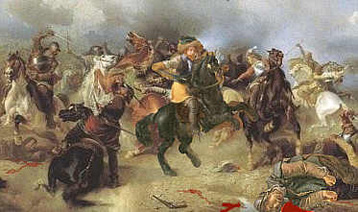Battle of Lund

Background to the Battle of Lund
Following the Treaty of Roskilde in 1658, Denmark was forced to surrender parts of its territory to Sweden, east of the Sound (Öresund), including the counties of Skåne, Halland, Blekinge and, for a period, the island of Bornholm.
An opportunity presented itself in 1675, when Sweden, through its alliance with France, was drawn into the war against Austria Brandenburg and the Netherlands. Denmark declared war in the autumn of 1675 and in June 1676, a Danish army consisting of 15,000 men landed at the small fishing village of Råå. All of Skåne and Blekinge – with the exception of Malmö Castle, which remained under Swedish control throughout the war – quickly became occupied by Danish troops. The Danes’ arrival was welcomed by large sections of the population and the Danish administration was reinstated. The Swedish forces were forced to evacuate and retreat to the county of Småland.
On 17 August, 1676 the Danish and Swedish troops met in battle outside Halmstad, ending in a Danish defeat. The Danes retreated to their winter quarters in Skåne to avoid further conflict during that year. The Swedish army followed and in November, both armies gathered to the north of Lund. The Swedish army, suffering from disease and a shortage of supplies, now had to settle the matter once and for all or vacate Skåne. After reconnoitering the terrain south of the river Kävlingeån near where the Danes were encamped, the Swedish commanders decided on a surprise attack. The plan was executed on 4 December, 1676 while the river still remained frozen.

The Danish army, consisting of nearly 13,000 men compared to the Swedish army of about 8000, had significantly more artillery at their disposal.
Leading the armies were the two kings – thirty-year-old, Christian V of Denmark and twenty-one-year-old, Charles XI of Sweden.
